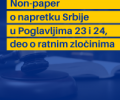Compensation lawsuits against Serbia for human rights abuses committed in the past
 Within the scope of its program offering support to victims of human rights abuses committed in the past in exercising their right to reparation, the Humanitarian Law Center (HLC) filed two compensation lawsuits against the Republic of Serbia (RS) at the First Municipal Court on behalf of Sabit Bibić from Sjenica who was tortured by Sjenica Internal Affairs Department (OUP) police officers in December 1993, and on behalf of Fehrat Suljić, a Bosniak who was abused by OUP Tutin police officers in February 1996.
Within the scope of its program offering support to victims of human rights abuses committed in the past in exercising their right to reparation, the Humanitarian Law Center (HLC) filed two compensation lawsuits against the Republic of Serbia (RS) at the First Municipal Court on behalf of Sabit Bibić from Sjenica who was tortured by Sjenica Internal Affairs Department (OUP) police officers in December 1993, and on behalf of Fehrat Suljić, a Bosniak who was abused by OUP Tutin police officers in February 1996.
At the beginning of December 1993, several unidentified police officers from the Sjenica OUP came to the family house of Sabit Bibić in the village of Ugao, asking him to surrender his “scorpion” gun. Although he told them he had no weapon at all, they ordered him to get in their police car and took him to the Karajukića Bunari local authority premises. While in the car, they hit him a few times with their truncheons. When they arrived at their destination, he was seated in an office where, half an hour later, he was joined by police officers Milorad Jovanović and Milinko Veličković. They asked him about the weapon he allegedly possessed. Shortly after, they started persuading him that if he really did not have one, he would be much better off if he quickly bought one and brought it to them. OUP Sjenica inspector Mile Nedić joined them shortly after and told the policemen that “they should know what to do”. When he left the office, they started hitting Sabit with their fists and truncheons in the head, all over his body, his hands, and the soles of his feet. Sabit lost consciousness under the power of their blows. He regained consciousness when they spilt some cold water on him but they resumed the beating immediately using their fists and truncheons. They held him at gunpoint threatening to kill him. After a while they let him go. The following day, Sabit Bibić reported the incident to the Sjenica Municipality secretary, Vučeta Vučetić, and to the OUP Sjenica chief of staff, Nikola Luković, but after a few days he received a letter to report at the Sjenica OUP for an informal questioning. During the questioning, a police officer nicknamed “Penda” asked Sabit again about the weapons in his possession. Since Sabit denied possessing any weapons at all, they took him to a prison cell. Sabit was released a couple of hours later.
In March of 1996 police officers Sulejman Hodžić and Zvonko Milunović came to the house of Fehrat Suljić in the Dolovo village and ordered him to go with them for informal questioning. Once they arrived at the police station in Tutin, Fehrat was taken to an office which was already occupied by police officer Slaviša Kiković, who started hitting him in the chest and back. When Fehrat Suljić fell to the floor, police officers Sulejman Hodžić and Zvonko Milunović continued kicking him in the back. After they had finished beating him, they handcuffed him to a radiator in the office. They released him shortly after. Fehrat Suljić was diagnosed with permanent damage to the spine and kidneys as long term consequences of the torture.
In the course of the armed conflict in Bosnia and Herzegovina, members of the Ministry of the Interior of the Republic of Serbia conducted frequent weapons searches in the houses of Bosniak residents in the Sandžak. Regardless of the fact that in most cases they did not find any weapons, police members often deprived Bosniak men of their freedom and beat them in police stations to coerce confessions from them that they possessed fire arms or that they were engaged in “acts against the state”. Although these cases were reported to the authorities, most of them were never seriously investigated nor were there any disciplinary measures against those responsible. On the contrary, the majority of the police officers who took part in the beatings of Bosniaks from Sandžak are still employed by MUP Serbia.
HLC calls upon the state institutions of the Republic of Serbia to act in accordance with the principles of the rule of law and offer adequate compensation to the victims of human rights abuses committed by members of the Serbian Army and police.






